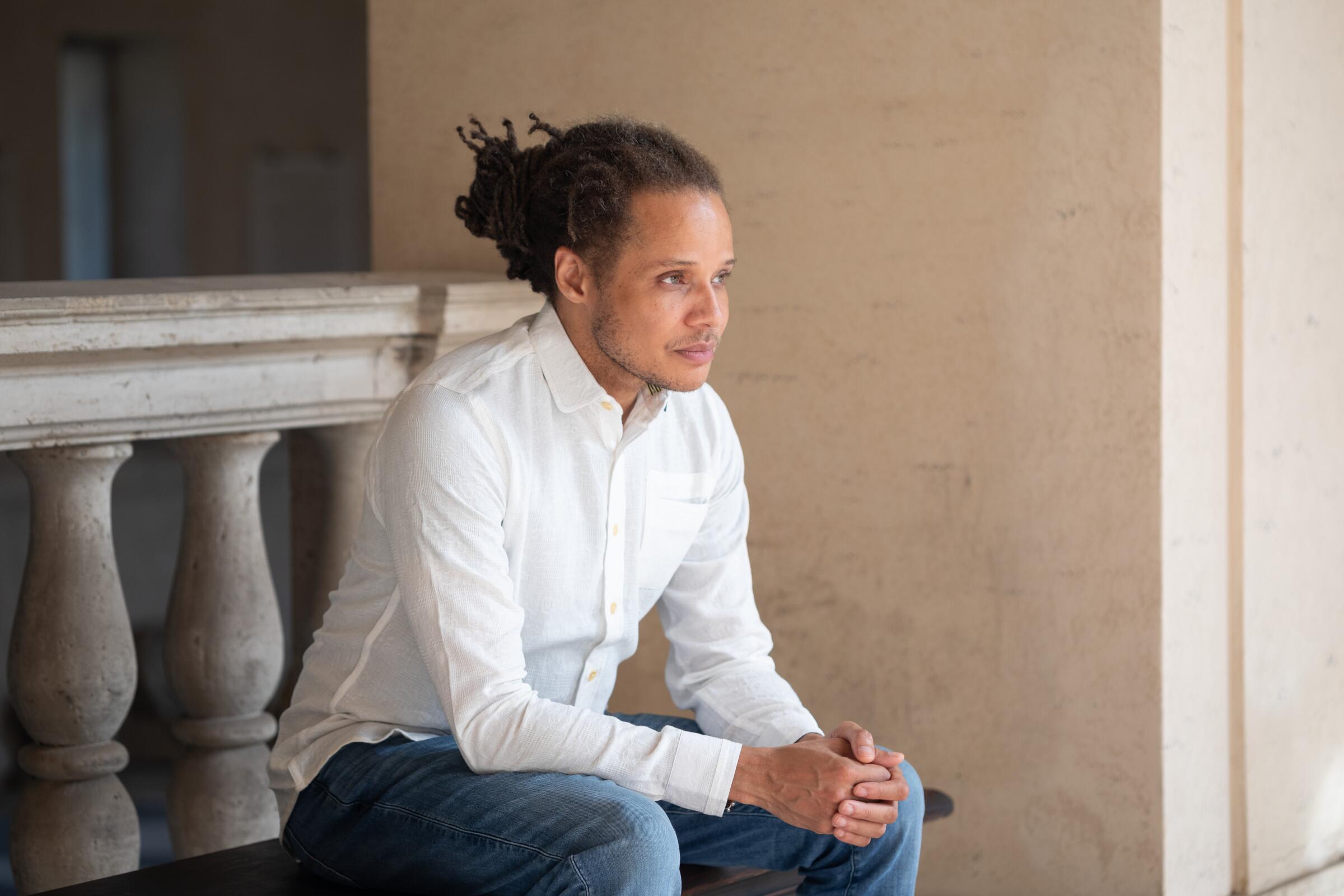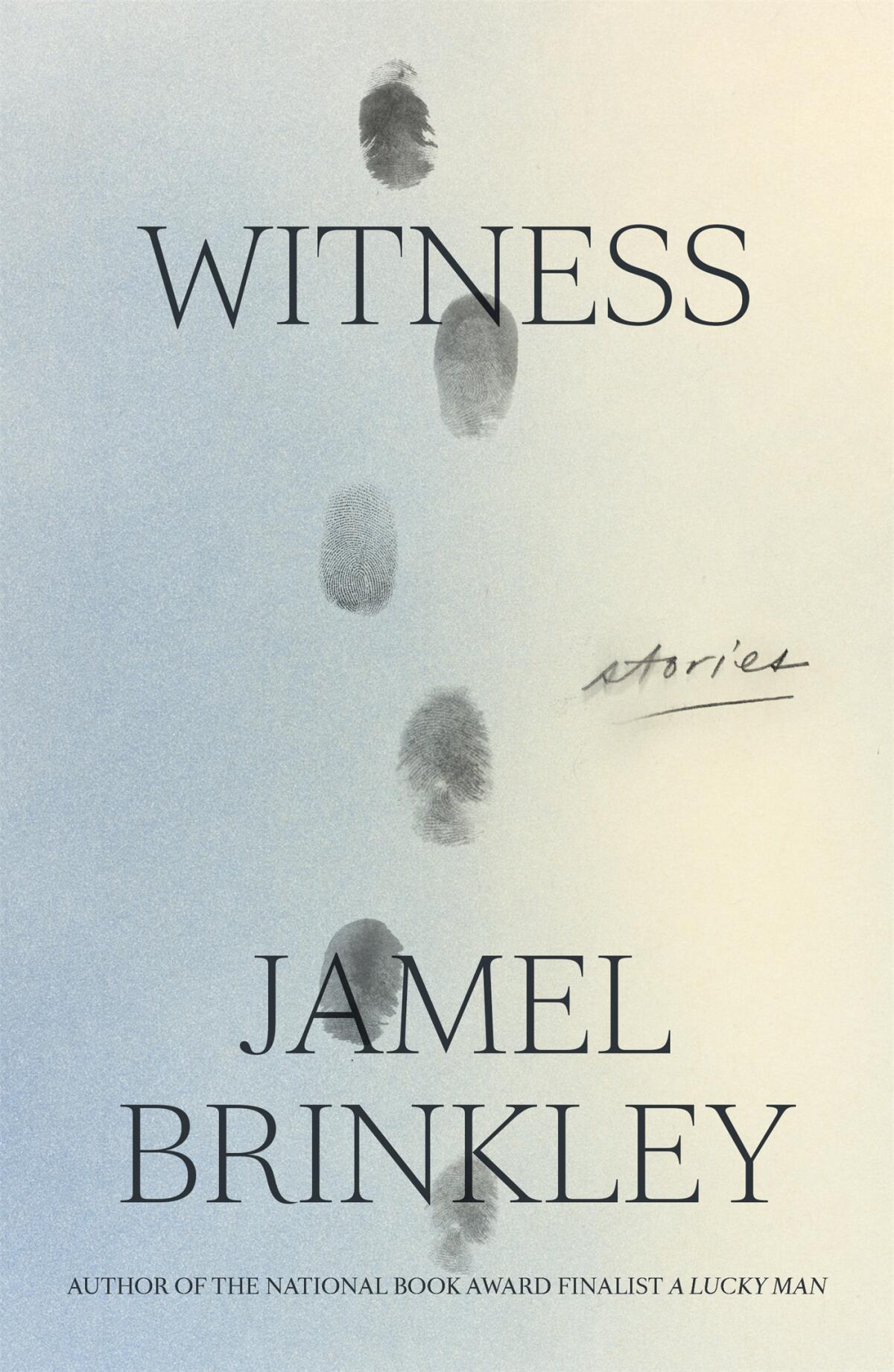Sign up for our Book Club newsletter
Get the latest news, events and more from the Los Angeles Times Book Club, and help us get L.A. reading and talking.
You may occasionally receive promotional content from the Los Angeles Times.

On the Shelf
Witness: Stories
By Jamel Brinkley
FSG: 240 pages, $27
If you buy books linked on our site, The Times may earn a commission from Bookshop.org, whose fees support independent bookstores.
On Zoom, Jamel Brinkley is much like his short stories: quiet and unassuming, funny, warm and generous with a sharp undertow of spiky intelligence. Minutes before getting on our call, I had mentioned him to novelist Xochitl Gonzalez, a former student of Brinkley’s at the Iowa Writers’ Workshop. “Oh, Jamel!” Gonzalez said. “He’s the kindest, most generous teacher.”
It seldom makes much sense to equate a writer’s teaching (or for that matter his conversation) with what he puts on the page. Often, writers have a hard time explaining the sort of magic they’re able to perform in their own work. But Brinkley, who grew up first in Fort Greene, Brooklyn — “Before it was Fort Greene,” he says — and then in South Bronx public housing, constructs the cityscapes of his stories with such deliberate, exacting love and care that this description of his teaching made perfect sense to me.
Late in our conversation, as he describes a deep engagement with his students, it sounds much like the attention he showers on every character in his new short story collection, “Witness,” whether a woman grieving a brother shot by police, a man nursing buried trauma or a half-comprehending child faced with predatory gentrifiers.
“I feel like I’m giving myself over completely to the draft I’m reading, really putting myself into that space and trying to work from within it,” Brinkley says of his workshops; his main goal is to help students “ask good, intelligent, informed, exciting, creative questions about their work.”
It’s this sense of rigorous curiosity that also feels alive in the stories, a desire less to show you how things are or how Brinkley sees them than to help you get inside these experiences fully enough to ask questions of your own.
Following his widely celebrated 2018 debut collection, “A Lucky Man” — a finalist for a National Book Award, the John Leonard Prize and the Hurston/Wright Legacy Award — “Witness” not only feels more sharply made, moving more dexterously through different lengths, registers and points of view, but also does what sometimes feels impossible in a collection of unlinked stories, which is to feel like a truly coherent book.
Brinkley knew from the outset that he meant to have an operating principle — the idea of “witness” that serves as the title and is sharpened by the book’s epigraphs. He elaborates on these with the questions he was circling: “How does one push oneself to perceive what one needs to perceive instead of what one wants? … In the face of overwhelming systemic forces, how do we stay alert and sensitive and vulnerable, how do we wrestle with our imperfect selves, how do we endure, show care, pursue pleasure, joy, love?”
In the new novel ‘Flight,’ author Lynn Steger Strong’s keen sense of class and character enriches the story of a fraught Christmas family gathering.
The clarity of these questions scared him at first. “I think I worried that it would be too limiting … that the arrow would point bright neon lights at this thing in a way that people would be like, ugh, boring.” Instead, he says, this initial constraint opened him up to new possibilities within the form. “I think it ended up being productively generative and liberating in a sense that the best constraints can be.”
The concept of witness builds and churns and layers over the course of the reading. The characters are witnesses of loss, of place, of disappearing siblings, cousins, parents, friends. You’ve read stories set in Brooklyn, surely. But fewer have been written about the people and the textures, the situations and the struggles Brinkley writes about — people who are also being witnessed, acted upon by the world, forced to grapple with the aspects of their lives they might prefer not to.

“I do believe you have to look,” says Brinkley. He does not shy away from stories we think we know but of course don’t: the aftermath of police violence, medical racism, deed theft, the slow loss of history in changing places like Fort Greene. It’s no small task to help a reader see such things anew.
Brinkley’s narrator in “That Particular Sunday” nails this precise difficulty while trying to capture the weight and texture of his relatives’ now-lost apartment: “This kind of boiled down nonsense might as well be in a newspaper clipping, or an obituary. It’s the kind of thing I find difficult to bear. It doesn’t mean a thing. It doesn’t capture what it felt like to be there. The depth of feeling that was reliable and unvarying.” This depth of feeling is Brinkley’s work, his offering.
“It’s about finding interesting angles that are going to let you look more carefully at the people inside of these stories,” says Brinkley. In the story “Comfort,” we’re years removed from a police officer’s killing of Simone’s brother. So deep is she — are we — inside her grief that the story opens with her unclear on the month or year. But it’s also a story about Simone’s power in her body, her dancing with her brother before he was slain, the sex she has in part to stay alive.
In “Witness,” Bernice, who will continue to not be heard by doctors until it’s too late for anyone to help, is seen for most of the story as the narrator’s sister, brash and funny. She marries the wrong guy. “Part of these angles is to get to their light,” says Brinkley. “To let them be clever and witty and funny and complex.”
Lydia Kiesling’s second novel, ‘Mobility,’ is a political novel in the tradition of Upton Sinclair. That made it a great fit for Crooked Media’s publishing imprint
There’s something almost too easy about the way he describes this. Not because anything he says feels untrue, but because the stories are so extraordinarily perceptive. They hold decades inside them, slowly unpeel into intimacies between characters. The past is not flashback or backstory but wholly present for these people in the moments we encounter it: a woman who once stole a young man’s dad approaching him years later, equal parts alluring and precarious, asking him to dance; a ghost, in the story “Arrows,” whose body is the first that we encounter: “Helena Porter kept her room the way she said all bedrooms should be kept.”
When I ask Brinkley about place, he quotes Eudora Welty (he is constantly quoting other classic writers: George Eliot, William Trevor, Edward P. Jones, James Baldwin—“I’m sort of thinking about James Baldwin all the time”). “Place is what sets your characters to scale,” Welty once said. Brinkley follows up with this: “Once you start to attend to place in a real tangible sense, not like a cardboard cutout but like real tangible objects with histories that are invested or imbued with emotion, then the characters become more real.”
This seems to relate back to the idea of angles. Many of these stories are told from the first person, but almost never start with the “I.” Instead, whole paragraphs and sometimes pages pass before the “I” declares itself. We start with setting, other people coming toward us, the “I” heard not through its own stated thoughts or feelings but through its way of looking, seeing, asking questions; through the ways its world and other people work to form and inform who they are.
Brinkley has rigorous control, in other words, of all the various aspects of his craft. But his power lives in what that control opens up for us to see.
In 1968, the two men convened an impromptu ensemble that they knew might destabilized their reputations. The day they spent, exhausted together on the crossroads of here and gone, is the kind of convergence they make movies about, so we forget it really happened.
Early in the opening story, “Blessed Deliverance,” the unnamed narrator tidies up his friend Antonio’s room as a kindness. Antonio’s mom is sick and their long-held friend group is dissolving.
“You stack the crusted cereal bowls on top of the smeared plates and neatly arrange all the used spoons and forks,” the narrator says. “With nothing but the palm of your hand, you wipe away the dust on the screen of his TV. You completely understand the power possessed by the illusion of order, so you clarify the shapes and lines of his room.”
This moment is a catalyst for feeling. The narrator tries to kiss his friend right after this and is rebuffed. Order is built, shapes and lines are constructed, but only so the moment of deep human feeling, of risk and vulnerability, a desperate grasp at intimacy, can take place. Each of these stories feels like this.
“You want the story to have a design,” says Brinkley. “To feel like it has a certain kind of unity … but your most personal stamp as a writer is when you unleash that sort of bubbling lava of who you are inside.”
Strong is a critic and the author, most recently, of the novel “Flight.”
Sign up for our Book Club newsletter
Get the latest news, events and more from the Los Angeles Times Book Club, and help us get L.A. reading and talking.
You may occasionally receive promotional content from the Los Angeles Times.